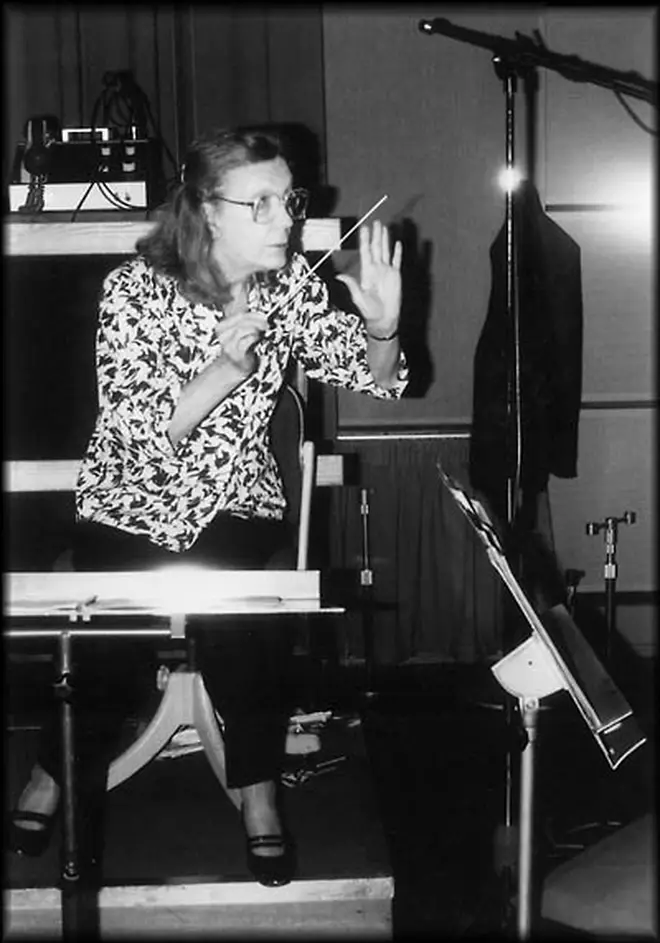On Air Now
Relaxing Evenings with Zeb Soanes 7pm - 10pm
3 February 2022, 16:02 | Updated: 4 March 2022, 16:44

Angela Morley was a multi Emmy Award-winning composer who transitioned to living publicly as a woman in 1972.
Born in Leeds in 1924, Angela Morley was a pioneering English composer, conductor, arranger, orchestrator and performer, who specialised in music for the screen.
She was also a three time Emmy Award-winning musical director, and the first openly transgender person to be nominated for an Oscar, receiving two Academy Award nominations in her lifetime. She was also nominated six times for an Emmy Award for outstanding music composition for a series.
Morley was a multi-instrumentalist. Growing up she played the piano, accordion and violin, before settling on the alto saxophone and clarinet. Her first foray into the professional world of music was at the age of just 15; as bands began losing their members to WWII drafting, a strong sight-reader and saxophonist like Morley was in popular demand. By the time she was 20, she had joined the Geraldo Orchestra, thought to be the best band in the UK at the time.
Her musical prowess took her from performer to musical director to composer, and eventually, from Leeds to Hollywood.
Read more: 15 great classical composers who also happened to be gay

The next stage of Morley’s career involved stints composing for British television and radio, conducting the orchestra on the comedy television series, The Goon Show, and as the musical director for the British section of Philips Records, a record label owned by the electronics company.
In 1958, Morley began an association with the Welsh singer Shirley Bassey, and composed multiple hit tunes for the performer including ‘As I Love You’, which reached No. 1 in the UK Singles Chart in January 1959.
Over the next decade, regretting having not pursued feature film composition, Morley found her way back into the industry writing the music for films such as The Looking Glass War (1969), Captain Nemo and the Underwater City (1969), and When Eight Bells Toll (1971).
Morley took two years out of the industry and transitioned in 1970, before publicly coming out as a woman in 1972. She was supported in this process by her second wife, Christine Parker, and Morley cites her partner as the love and support she needed in order to “deal with the trauma, and begin to think about crossing over that terrifying gender border.”

Use The Force Luke...
In 1978 the beloved children’s classic, Watership Down was brought to the big screen in animated form. Hired to score the project was Australian composer, and Master of The Queen’s Music, Malcolm Williamson.
However, due to the pressure associated with the project, Williamson quit the project, delivering only seven minutes of music when recording was due to start just three days later.
Morley was brought in to save the day. She was reluctant at first to join the project, as she was unfamiliar with the children’s novel and was concerned at the lack of preparation time available to her. However, she worked quickly by using Williamson’s sketches, reading the book, and watching footage from the film. She subsequently delivered a full score within two weeks.
Morley was also a part of creating one of the most iconic scenes in cinema history. Journalist, Kenneth LeFave interviewed Morley for The Arizona Republic where she revealed, “You know the scene in Star Wars where Luke descends to the Death Star trench and the voice says ‘Use the Force, Luke?’
“That’s my orchestration.”
Read more: 18 brilliant LGBTQ+ opera stars you should know

John Williams conducts an extract from ‘Flight to Neverland’ from Hook
Morley continued collaborating with Star Wars composer, John Williams during the 1970s and 1980s. She worked on multiple films as an arranger, conductor, and orchestrator with the American composer and others, including Superman (1978), The Empire Strikes Back (1980), E.T. The Extra-Terrestrial (1982), Hook (1991), Home Alone (1990), Home Alone 2 (1992) and Schindler's List (1993). However, much of her work remains uncredited.
Her two Oscar nominations were for an Academy Award in the category of Best Original Song Score: first for The Little Prince (1974), and second for The Slipper and the Rose: The Cinderella Story (1978), which she shared with the Sherman Brothers. However, she was only credited as a conductor and arranger, despite also being a composer.
Morley was the first woman to be nominated for an Academy Award in this category.
She was also invited to arrange a medley of the five nominated film scores for the 73rd Academy Awards which was performed by Itzhak Perlman and Yo-Yo Ma at the 2001 Oscars ceremony.
Read more: Oscars to feature a female orchestra conductor for first time in history

Tan Dun Original Score Winner for Crouching Tiger, Hidden Dragon
The transgender community has historically been discriminated against, and due to her concern over potential backlash to her transition, Morley didn’t come out publicly as a woman until two years after her gender reassignment surgery. She declined television opportunities during this two-year period.
Post-operation, she was mostly embraced and celebrated in her career, although she did not always receive the recognition she deserved.
In an era infected with intolerance, Morley’s life story is one of openness and of pushing talent above all else to the forefront. After her death in 2009, her talent was noted by many of her peers, and her achievements were celebrated with the addition of a blue plaque at her birthplace in Leeds. She has also been listed by numerous media outlets among other talented trans women in the film industry, including the Wachowski sisters – Lana and Lilly Wachowski – who wrote and directed The Matrix (1999) and subsequent sequels.
Morley’s spectacular career deserves to be platformed and her success should serve as an encouragement for musicians today to work and achieve in this industry, regardless of their gender and sexual identities.

Angela Morley Speech 1999